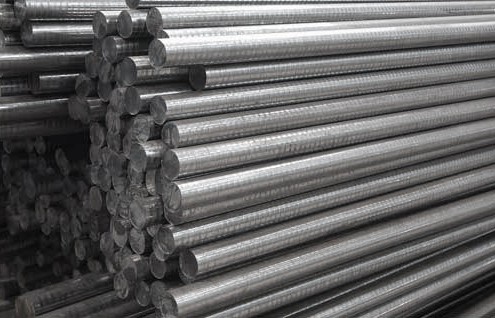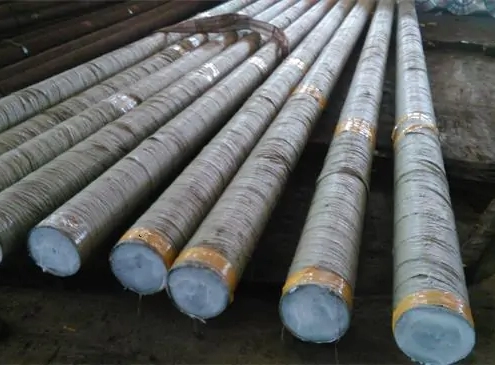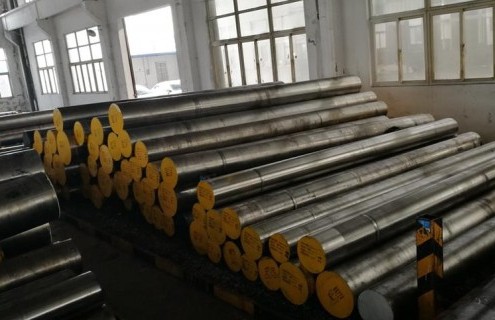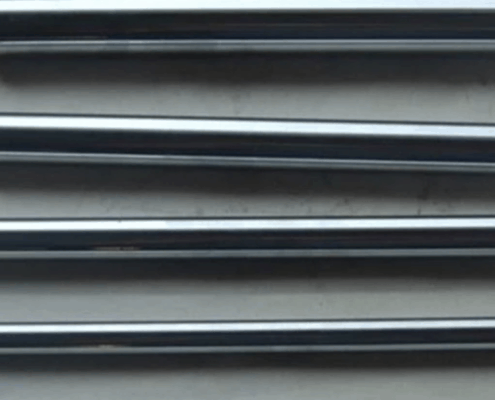AISI 8620 Alloy Steel
WALDUN is one of the best AISI 8620 steel Manufacturers and Exporters, supplied with round,square,flat,block,and shaft etc.
AISI 8620 is defined as low carbon alloy steel which has 0.5% Cr, 0.2% Mo and 0.5% Ni as strengthening alloy elements.It is generally supplied as annealed condition with hardness HB255max.
AISI 8620 has good wear resistant with case hardness HRC 60-63 when carburized, hardened and tempered.Compared with grades 8615 and 8617, it shows good core strength and toughness properties with a typical tensile strength range of 700-1100 MPa,in small to medium sized sections.
AISI 8620 is suited for applications which require a combination of toughness and wear resistance. it is commonly used in the engineering and automitive industries for toolholders and other such components.
Typical application:Arbors, pinions, bushes, camshafts, kingpins,ratchets, gears, splined shafts etc.
AISI 8620 Alloy Steel Supply Form & Size & Tolerance
| Supply Form | Size(mm) | Process | Tolerance | |
| Round | Φ6-Φ100 | Cold Drawn | Bright/Black | Best H11 |
| Φ16-Φ350 | Hot Rolled | Black | -0/+1mm | |
| Peeled/ground | Best H11 | |||
| Φ90-Φ1000 | Hot Forged | Black | -0/+5mm | |
| Rough Turned | -0/+3mm | |||
| Flat/Square/Block | Thickness :120-800 | Hot Forged | Black | -0/+8mm |
| Width:120-1500 | Rough Machined | -0/+3mm | ||
Remark:Tolerance can be customized as per requests
AISI 8620 Alloy Steel Chemical Composition per ASTM A29
| GRADE | C | Si | Mn | P | S | Cr | Mo | Ni |
| 8620 | 0.18-0.23 | 0.15-0.35 | 0.70-0.90 | ≤ 0.035 | ≤ 0.040 | 0.40-0.60 | 0.15-0.25 | 0.40-0.70 |
AISI 8620 Alloy Steel Physical Property
| Density g/cm3 | 7.85 |
| Melting point Deg F | 2600 |
| Poisson’s ratio | 0.27-0.30 |
| Machinability (AISI 1212 as 100% machinability) | 65% |
| Thermal expansion (20 ºC)(ºC ˉ ¹) | 12.2*10^-6 |
| Specific heat capacity J/(kg*K) | 477 |
| Thermal conductivity W/(m*K) | 46.6 |
| Electric resistivity Ohm*m | 2.34*10^-7 |
AISI 8620 Alloy Steel Mechanical Property
Typical Mechanical Properties For Core – Carburised and Oil Quenched at 840 °C
| Section Size | 11mm | 30mm | 63mm |
| Tensile Strength Mpa | 980-1270 | 780-1080 | 690-930 |
| Yield Strength Mpa | ≥785 | ≥590 | ≥490 |
| Elongation % | ≥9 | ≥10 | ≥11 |
| Charpy Impact J | ≥41 | ≥41 | ≥41 |
| Hardness HB | 290-375 | 235-320 | 205-275 |
| Hardness HRC | 31-41 | 23-35 | 16-29 |
AISI 8620 Alloy Steel Hardenability Limits
| Distance from quenched end mm | 1.5 | 3 | 5 | 7 | 9 | 11 | 13 | 15 | 20 | 25 | 30 | 35 | 40 |
| HRC Min | 41 | 37 | 31 | 25 | 21 | – | – | – | – | – | – | – | – |
| HRC Max | 48 | 47 | 43 | 39 | 35 | 32 | 30 | 29 | 26 | 24 | 23 | 23 | 23 |
Hardness values under 20HRC is not specified.
AISI 8620 Alloy Steel Forging
Forging temperature should be carried out between 925℃-1230℃,AISI 8620 has low carbon content which is less susceptible to cracking than medium or high carbon steels,so it may be heated and cooled more rapidly.Soaking time at forging temperature should be as short as possible to avoid heavy scaling and excessive grain growth.The lower the forging-ending temperature ,the finer the grain size .Don’t forge below minimum forging temperature 850°C.This alloy should be cooled in sand.
AISI 8620 Alloy SteelAISI 8620 Alloy Steel Normalizing
Normalizing is used to refine the structure of forgings that might have cooled non-uniformly after forged,and considered as a conditioning treatment before case hardening.Normalizing temperature for AISI 8620 steel should be carried out between 900℃-925℃. hold suitable time for the steel to be thoroughly heated to complete the ferrite to austenite transformation.Cool in still air.This treatment is considered as another method of improving machinability.
AISI 8620 Alloy Steel Annealing
Full annealing is recommended for AISI 8620 before machining, AISI 8620 should be carried our at a nominal temperature of 820℃-850℃,hold suitable time for the steel to be thoroughly heated, then furnace cooling.
AISI 8620 Alloy Steel Case Hardening
Following core refining, Heat the temperature to 780oC – 820oC, hold suitable time for the steel to be thoroughly heated, and quench in oil.Temper as soon as possible after quenched.
AISI 8620 Alloy Steel Tempering
Tempering is usually carried out to relieve stresses from the hardening process,it will improve the toughness of both case and core, with only a little reduction in core strength and case hardness.Heat the AISI 8620 steel to 150oC – 200oC as required, hold enough time until temperature is uniform throughout the section, soak for 1 – 2 hours per 25 mm of section, and cool in still air.
AISI 8620 Alloy Steel Caburizing
Pack, salt or gas carburize at temperature 900oC – 925oC, holding enough time to obtain the required case depth and carbon content, followed by a suitable hardening and tempering cycle to optimise case and core properties.
AISI 8620 Alloy Steel Certificate & Third-party Testing
AISI 8620 MTC Report
TUV Testing Report
8620 steel FAQ: Frequently Asked Questions
What is 8620 steel?
8620 is a type of high carbon tool steel that has excellent machinability and toughness. This means it can be easily cut with machine tools, while also being strong enough to withstand substantial forces without breaking. It’s typically used in the production of cutting tools, such as knives or drill bits, but can also be found in other applications like saw blades or wrenches.
Do I need 8620 steel for my project?
Whether you’re building a knife or designing an airplane wing, 8620 steels are great choices for your application. They offer all the benefits of other types of high-carbon tool steels at a reasonable cost. What’s more, 8620 steels are available in a wide range of shapes and sizes.
What is 8630 steel?
8630 is an alloy tool steel that has similar properties to 8620 but with some added strength due to the addition of molybdenum. It’s also called “moldsteel” because it can be used for mold making applications such as creating wax patterns for lost-wax casting methods.
What makes 8630 different from other types of high carbon mold steels?
8630 provides extra toughness and hardness while still offering excellent wear resistance at moderate cost compared to other high carbon type H mold steels like LK100 or PM120C which require heat treatment processes during production later on before use.8630 steel is available in bar, sheet and plate product forms.
What’s the difference between 8620 and 8640 steel?
8620 and 8640 are both types of high carbon steels, but they have different chemical compositions. 8620 has a higher chromium content than 8640, which gives it better corrosion resistance. It also has a higher manganese content, which improves its toughness.
What applications is 8640 steel best suited for?
8640 is particularly well-suited for use in automotive applications such as gears, axles, or engine parts. It offers good wear resistance and strength while remaining relatively affordable compared to other types of tool steels.
Is there anything else I need to know about 8620 or 8640?
8620 and 8640 are ideal choices for many tooling, automotive or other industrial applications thanks to their strength, toughness and affordability. They’re both readily available in a range of shapes including bars, plates, sheets, roundsand flats. However 8620 is more corrosion resistant due to its higher chromium content while 8640 has better wear resistance because it contains molybdenum which improves hardness.
What’s the average price per pound for 8620 steel?
These prices vary based on location but you can expect anywhere from $0.50 – $15/lb depending on supplier volume discounts as well as product form (sheet metal vs plate).
Is there any limit to how much I can order?
There’s no limit to how much 8620 steel you can order. However, the larger your purchase quantity is, the more advantageous it will be for you in terms of price per pound and shipping discounts.
Is 8620 steel suitable for knife making?
8620 steels are great choices for many applications including building knives with excellent toughness and wear resistance while remaining easy to machine when needed. They suit a variety of blade shapes including drop point, clip point or tanto styles depending on the application at hand.
What type of blacksmithing projects do 8630 steels work well with?
8630 moldsteel has similar properties compared to 8620 but offers some extra strength thanks to its molybdenum content. It’s ideal for use in blacksmithing projects that require high toughness and strength such as hammers, chisels or punches. 8630 steel is available in bar, sheet and plate product forms.
What other types of tool steels are similar to 8620?
8620 steels have many similarities with other type AISI/SAE tool steels like ATS-34, D-37 and S-50C. They all offer good wear resistance, toughness and strength making them ideal choices for a variety of industrial applications. However 8620 steel offers the best overall value due to its combination of properties while still remaining easy to machine when needed.
What’s the difference between hardness and toughness?
Hardness is a measure of how resistant a material is to surface deformation while toughness measures its resistance to fracture and failure. 8620 steels offer both hardness and toughness, which makes them suitable for a wide range of applications including those that require high endurance such as automotive parts or gears.
What’s the difference between 8630 steel plate and 8630 bar?
There are many differences between plates vs bars besides just their shape. 8630 is also available in several different product forms such not limited to hot rolled round rods, flat stock, angles/channel beams/C-beams etc depending on your needs.
What type of tools can I make with 8640 steel?
8640 has superior wear resistance compared to other types of mold steels because it contains molybdenum making it ideal for use in tools that see a lot of wear. This includes punches, dies, and shear blades. 8640 is also great for knife making because it offers good toughness and strength in a relatively affordable package.
What are the general properties of 8620 steel?
8620 steel is a type of alloy steel that contains chromium and molybdenum as its main alloying elements. It has many excellent properties including high toughness, good wear resistance, moderate strength and affordability. It is readily available in bar, sheet and plate product forms making it easy to use in a variety of applications.
Is 8620 steel magnetic?
8620 steels are not generally considered to be magnetic materials but they can become magnetized under certain circumstances. If you need to know if 8620 steel is magnetic or not, please consult the supplier and perform tests yourself.
What properties of 8640 make it ideal for use in die casting?
8640 offers several advantages over other types of tool steels such as D-37 making it a good choice for many applications including those found inside die cast molds like punches and blades. 8630 has excellent wear resistance which makes it an especially great choice for tools that require high endurance such as dies used to mold plastics.
What’s the difference between 8660 and 8670 Steel?
8660 represents one grade within series of alloy tooling steels containing cobalt instead of chromium while 8670 contains less carbon than standard grades (0.% vs 0.45%) 8660 is available in bar, sheet and plate product forms while 8670 is only offered as a bar. 8660 offers good wear resistance, toughness and strength while 8670 has even better wear resistance but lower toughness and strength. Both steels are great choices for tools that require high levels of hardness and durability.
What types of projects is 8620 steel best suited for?
8620 steel is an excellent choice for a variety of industrial applications including those that require high toughness and strength such as hammers, chisels or punches. It is also well-suited for automotive parts or gears that need to withstand a lot of wear and tear. 8620 steels are readily available in bar, sheet and plate product forms making it easy to use in a variety of applications. 8620 is also great for knife making because it offers good toughness and strength in a relatively affordable package.
Where can I find 8640 steel?
8640 has superior wear resistance compared to other types of mold steels because it contains molybdenum making it ideal for use in tools that see a lot of wear. This includes punches, dies, and shear blades. 8640 is also great for knife making because it offers good toughness and strength in a relatively affordable package.. The most common grade available commercially are 8630 which comes as either hot rolled round rods or flat stock while 8640 usually only offered as hot rolled bars/rods or flats with no sheet product forms commonly available.
What’s 8640 steel?
8640 is a type of alloy tooling steel containing chromium and molybdenum as its main alloying elements. It has excellent wear resistance, good toughness and moderate strength making it ideal for many types of industrial applications such as punches or dies used in die casting or knife making. 8620 steels are readily available in bar, sheet and plate product forms making them easy to use in a variety of different projects. 8630 offers better wear resistance compared to 8640 but comes with slightly lower strength.
What kinds of tools can I make using 8670 Steel?
8670 contains less carbon than standard grades (0% vs 0.45%) which makes it great for use when you need greater levels of hardness without sacrificing toughness. 8670 is also available in bar, sheet and plate product forms making it easy to use for many different projects. 8660 offers good wear resistance, toughness and strength while 8670 has even better wear resistance but lower toughness and strength. Both steels are great choices for tools that require high levels of hardness and durability like dies used inside die casting molds or piston pins inside engines..
What does 8630 steel contain?
8630 contains 0% carbon which makes it ideal for applications where the tooling will be exposed to temperatures over °F (°C). It can still be hardened through heat treatment however this may make its surface more prone to damage from excessive heat exposure due to a lack of hardening depth as compared with other 8620 grades. 8630 is also available in bar, sheet and plate product forms making it easy to use for many different projects..
What are 8660 Steel Bar?
8660 represents one grade within series of alloy tooling steels containing cobalt instead of chromium while 8670 contains less carbon than standard grades (0% vs 0.45%) 8660 is available in bar, sheet and plate product forms while 8670 is only offered as a bar. 8660 offers good wear resistance, toughness and strength while 8670 has even better wear resistance but lower toughness and strength. Both steels are great choices for tools that require high levels of hardness and durability like dies used inside die casting molds or piston pins inside engines..
Other Related WALDUN Steel
Page Contents
- AISI 8620 Alloy Steel Supply Form & Size & Tolerance
- AISI 8620 Alloy Steel Chemical Composition per ASTM A29
- AISI 8620 Alloy Steel Physical Property
- AISI 8620 Alloy Steel Mechanical Property
- AISI 8620 Alloy Steel Hardenability Limits
- AISI 8620 Alloy Steel Forging
- AISI 8620 Alloy SteelAISI 8620 Alloy Steel Normalizing
- AISI 8620 Alloy Steel Annealing
- AISI 8620 Alloy Steel Case Hardening
- AISI 8620 Alloy Steel Tempering
- AISI 8620 Alloy Steel Caburizing
- AISI 8620 Alloy Steel Certificate & Third-party Testing
- 8620 steel FAQ: Frequently Asked Questions
- What is 8620 steel?
- Do I need 8620 steel for my project?
- What is 8630 steel?
- What makes 8630 different from other types of high carbon mold steels?
- What’s the difference between 8620 and 8640 steel?
- What applications is 8640 steel best suited for?
- Is there anything else I need to know about 8620 or 8640?
- What’s the average price per pound for 8620 steel?
- Is there any limit to how much I can order?
- Is 8620 steel suitable for knife making?
- What type of blacksmithing projects do 8630 steels work well with?
- What other types of tool steels are similar to 8620?
- What’s the difference between hardness and toughness?
- What’s the difference between 8630 steel plate and 8630 bar?
- What type of tools can I make with 8640 steel?
- What are the general properties of 8620 steel?
- Is 8620 steel magnetic?
- What properties of 8640 make it ideal for use in die casting?
- What’s the difference between 8660 and 8670 Steel?
- What types of projects is 8620 steel best suited for?
- Where can I find 8640 steel?
- What’s 8640 steel?
- What kinds of tools can I make using 8670 Steel?
- What does 8630 steel contain?
- What are 8660 Steel Bar?
- Other Related WALDUN Steel















